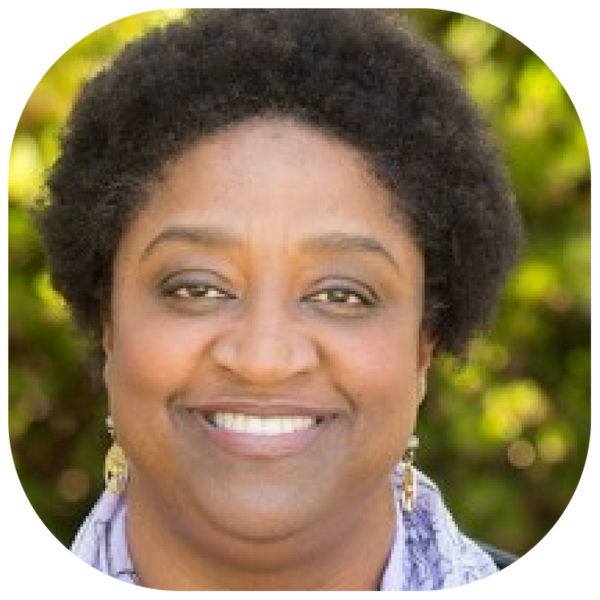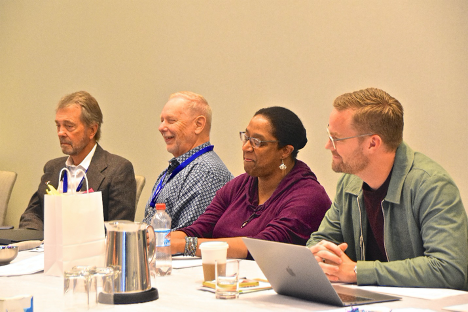
Today our volunteer spotlight shines on Heather Hall, MD. Dr. Hall works as a psychiatrist and has been a member of the Board of Directors since 2017. She has served on the Scientific Committee since 2017 and the Annual Conference Committee since 2016, including serving as their Chair since 2019.
Most recently, Dr. Hall and Dr. Michael Salter started a Public Health Task Force in 2018. This Task Force is playing a valuable role in broadening the focus of ISSTD to also include the public health implications of trauma and dissociation. They presented a workshop exploring these issues at the 2019 Annual Conference in New York, and have also recently submitted a paper on this topic for publication.
Dr. Hall lives in the Sacramento, California area because she loves the weather and the diversity there. Her early career began in community agencies. She also was on the faculty at the University of California, San Francisco for nine years, where she was a medical director on their cultural focus units, gaining experience working with Black, Asian, and LGBT patients. She has been in private practice for the last seven years. In her spare time she enjoys playing classical piano.

Tell us something most of us may not know about you.
I was born in Jamaica and immigrated to the United States as a small child.
How did you first learn about dissociation?
I first learned about dissociation as a second-year psychiatric resident in Philadelphia. A patient with DID, then call MPD, was admitted to the unit on which I was working. Dr. Rick Kluft was an attending at that hospital, and he volunteered to supervise my work with this patient.
Then, in 2012, after years of working with these patients, in what seemed like the wilderness, I researched organizations that were involved with their care. I found ISSTD and wanted to feel less isolated, and so was glad to join.
My greatest challenge now is simply time because I am so involved, but also am running a full-time private practice.
What led you to volunteering with ISSTD?
As a psychiatrist, I knew that dissociative disorders were being ignored, and I wanted to help change that.
How have you seen ISSTD grow over time?
The organization has grown more financially stable during my time on the Board of Directors. We are also seeking to improve our diversity and are developing ways to reach out to clinicians of all backgrounds. The ISSTD has continued to grow in numbers as well.
What was that like for you, with the pandemic outbreak happening just as the ISSTD conference was about to begin, and so many legal changes happening in California – literally the week the conference was supposed to start… leading up to having to cancel the conference the very day it was to begin?
It was a stressful time. We had worked so hard to create the conference content! The idea of canceling it seemed impossible. Also, there was a fear that canceling it would bankrupt the ISSTD. We had pandemic insurance (thanks to Mary Pat Hanlin), but if we canceled too soon, we would not be able to make a claim.
In addition to the financial considerations of cancelling, we were also very aware of the potential of infecting the attendees if we did decide to go through with the conference.
These seemed to be hugely consequential decisions we were making.

What do you hope for in the ISSTD future?
I hope to see continued growth in numbers, financial stability, and diversity.
I hope to see us branch out and address complex trauma and dissociative experiences more broadly.
I would also like us to be leaders in understanding how societal factors impact the development of dissociative disorders.
What would a more diverse ISSTD look like, feel like, present as, be experienced as?
It would look more like the population of the world. Complex trauma and dissociation are worldwide phenomena, and so I would like to see members who come from every country in the world. I would like to see the ISSTD focus on how cultural and societal differences can shape dissociation processes.
I would love to see our conference attended by thousands of people from all over the world. I would love to see a universal awareness of the role of bias in all aspects of society. We all fall victim to it, and it leads to so much suffering. We are either racists or anti-racists. Whenever we have power and act on our racial biases, then we are behaving in a racist manner. Even a child on a playground has potential power.
Got an idea of someone to feature in Volunteer Spotlight? Email news@isst-d.org!

